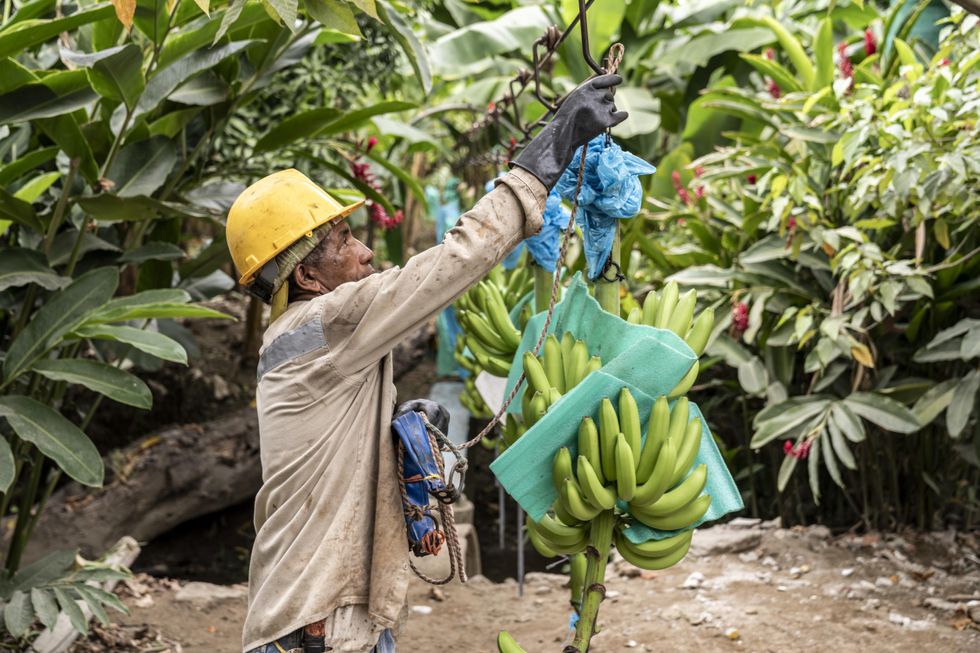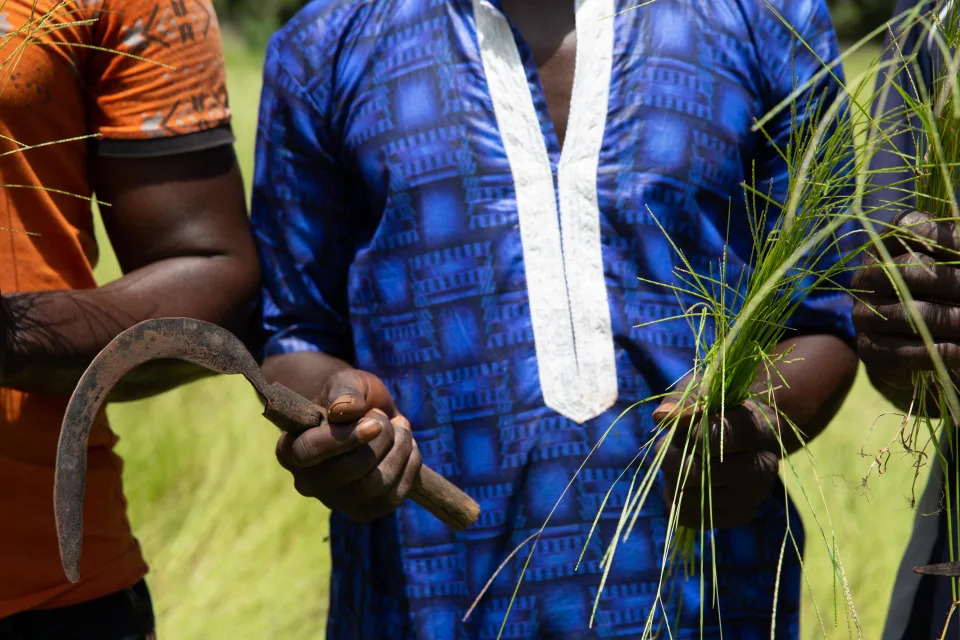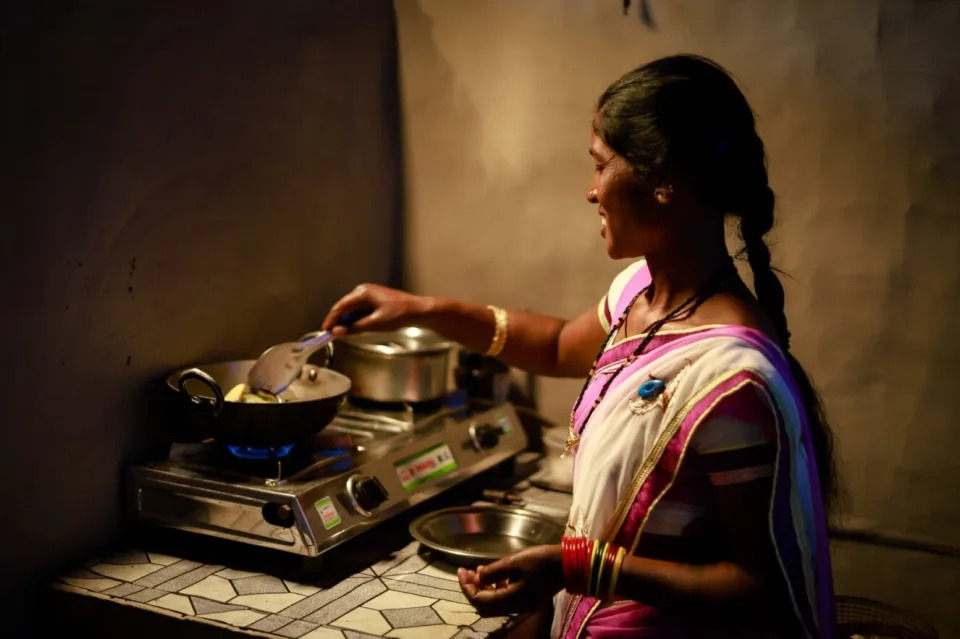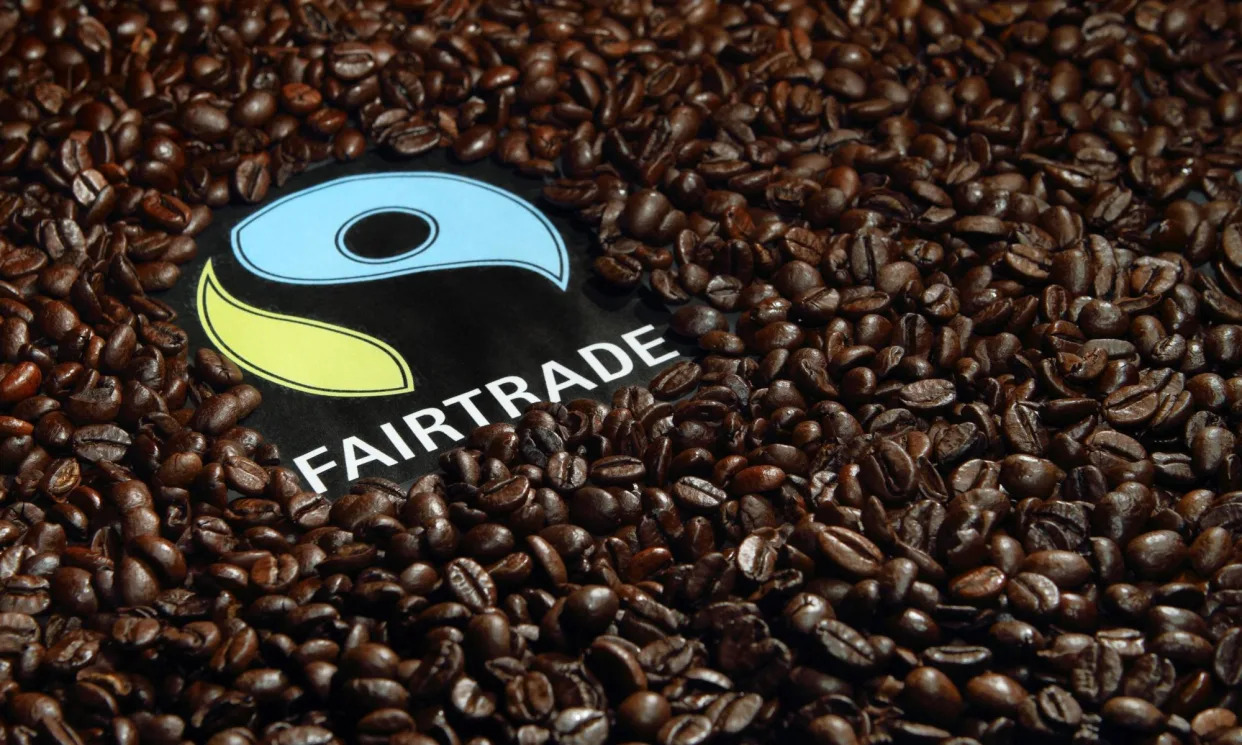Rebecca Speare-Cole

A worker processing bananas at a farm near Orihueca in Magdalena, Colombia (Fairtrade/PA)
PA Media - Chris Terry
Fairtrade is thanking British shoppers for supporting low-income farmers around the world, as research suggests that two-thirds opted to buy certified products this year.
Marking its annual Fairtrade Fortnight campaign, the organisation said the British public has helped to protect the future of everyday essentials like bananas, cocoa, tea, flowers, coffee and more, through their purchasing decisions.
Research by YouGov found that seven in 10 UK adults (69%) said they bought a Fairtrade product, which are produced by farmers and agricultural workers overseas.

A supermarket shopper chooses a bunch of Fairtrade bananas as the organisation thanks British consumers for their support of low-income farmers (Fairtrade/PA)
Fairtrade’s minimum price, premium payments, standards and guaranteed fairer prices mean farmers can afford to put food on the table, send their children to school, cover farm costs and adapt to climate change.
The certification body said that retail sales of Fairtrade products generated around £28 million in premium payments in 2023, which went directly to the producers so they could invest in business, community, healthcare, education and climate resilience projects.
During Fairtrade Fortnight, which kicks off on Monday, the organisation is joining up with supermarkets and leading brands to thank millions of people across the UK for their impact on these farmers’ lives.
This includes billboards placed outside supermarkets in London, Manchester, Birmingham, Bristol, Cardiff and Edinburgh from Monday, congratulating shoppers on their support and encouraging them to buy more Fairtrade.
The billboards will highlight local purchasing figures, such as nine in 10 adults (89%) in Edinburgh buying a Fairtrade product last year and 65% of adults in Bristol enjoying Fairtrade chocolate.
The Co-op will offer a 10% discount on Fairtrade products for their members during the two weeks while brands like Maltesers, Ben & Jerry’s, Green & Blacks, Clipper and Cafedirect will also join the celebrations, the organisation said.

Jaime Alberto Garcia Florez, a Sierra Nevada farmer, tends to his coffee crops at his farm in Siberia township, Colombia (Fairtrade/PA)
Elsewhere, thousands of grassroots supporters in communities, schools, places of worship and universities are planning hundreds of special events across the country to celebrate the campaign as well as Fairtrade’s 30th anniversary.
Marie Rumsby, Fairtrade Foundation’s director of advocacy, said: “Every Fairtrade purchase makes a difference to farmers’ lives, and we want to remind shoppers that when they next visit a supermarket, they choose products with the Fairtrade logo, as these ensure farmers receive fairer prices for their hard work and can invest in their families and communities.
“Without the stability a fairer trade system provides – and as farmers tell us climate change is making it harder to grow crops – it is more important now than ever to show solidarity so future generations of farmers will be able to continue farming.
“But choosing to buy Fairtrade products helps build their resilience to these global challenges and helps keep our favourite products on our supermarket shelves.”
Elsewhere, Fairtrade research revealed that significant sections of the British public continue to back fair prices and fairer terms of trade for overseas farmers.
The survey found that 85% of UK adults think farmers in low-income countries should receive stable and fair pay for the products they grow.

Coffee beans at the Red Ecolsierra association in Santa Marta, Colombia (Fairtrade/PA)
And more than half (54%) of UK adults understand that buying Fairtrade has a positive impact on the lives of farmers and workers.
Fairtrade also found that the majority of the UK public shares its concerns about climate change putting production and supply at risk, and the impact this could ultimately have on prices.
Its latest poll revealed that 4 in every 5 adults in the UK (79%) are concerned about the potential effect of climate change on the price of food in the UK.
A similarly high number – 69% – are concerned about the potential effect of climate change more widely on the supply of food in the UK.
Fairtrade charity says people are making ‘conscious’ choice to buy its products
Zoe Wood
Rebecca Speare-Cole, PA sustainability reporter
Sun 8 September 2024
Fairtrade brands and retailers are calling on competitors to sell more products sourced on fairer terms to boost the impact on low-income farmers around the world.
Clipper Tea, Brewgooder and the Co-op said they would like to see more sales in their sectors on Fairtrade terms to better support farmers who produce everyday essentials like bananas, cocoa, tea, and coffee.
It comes as the certification body marks its annual Fairtrade Fortnight campaign, calling on shoppers, MPs, retailers and brands to “Be the Change” in an unfair trade system that leaves farmers round the world facing increasingly insurmountable challenges.

Fonio grain farm workers in Guinea, West Africa (Brewgooder/PA)
Fairtrade’s minimum price, premium payments, standards and guaranteed fairer prices mean farmers can afford to put food on the table, send their children to school, cover farm costs and adapt to climate change.
UK-based brewer Brewgooder said it hopes to see more brewers buying Fairtrade fonio grain after it recently established the first Fairtrade-certified brewing supply chain.
Set up in just six months, the supply chain aims to ensure farmers in Guinea, West Africa, are paid a fairer price for their work and grain, with 67 producers already signing up according to local cooperatives.
Brewgooder has made the new supply chain, named “open grain” accessible to any UK brewer or business so they can maximise the impact sales have on farmer communities.
Alan Mahon, founder at Brewgooder, said: “Alone we can make a small but meaningful difference, but as an entire industry – even if only adopting Fairtrade fonio in small amounts – we can support farmers in Guinea make a game-changing impact on these communities while simultaneously bringing quality and desirable products to market.
“Enabling other beer producers to use our supply chain makes that possible.

Brewgooder’s new IPA is made from fonio grain sourced on Fairtrade terms from farmers in Guinea (Brewgooder/PA)
“We’re not adopting Fairtrade fonio to give ourselves a (unique selling point), but to show what can be achieved when you collaborate with farming communities for a fairer deal.”
Organic brand Clipper, which is one of Fairtrade’s first and longest-standing tea partners, has long called for fairer prices across the sector.
Hayley Murgett, head of hot drinks marketing at Clipper-owner Ecotone, said if half the tea in the UK was sold as Fairtrade, the difference it could make to farmers would be “absolutely insane”.
“We’d love to see more and more brands coming onto the Fairtrade premium,” she said.
“The more tea that can be sold with Fairtrade, the better we can improve those lives of the workers and farmers, who will then be able to better secure their future as well through climate combating measures.”
The tea sector is among those facing more volatility in recent years including Indian tea prices surging over the summer as extreme weather hit yields, especially in Assam.

Clipper’s cookstoves project in India have helped to prevent deforestation (Fairtrade/PA)
Ms Murgett said Fairtrade’s premium can help farmers “offset some of the impacts”.
“I think that’s where Fairtrade and organic play a really important role for us to try and secure the future of tea,” she said.
With British shoppers making particularly heritage-based decisions about the brand of tea they choose, Ms Murgett said Clipper’s focus is how it can “disrupt that kind of pattern” and “get them to question that tea choice so they could make that sort of more Fairtrade and organic impact”.
Daniel Parr, Ecotone’s European R&D team leader, also said shopper’s value perception behind tea needs to be “much higher”, citing the fact that people are now willing to pay premium prices on coffee because of barista culture.
“You look at all the skill and craft and effort that goes into making a kilo of tea and then you’re seeing a few pence per tea bag,” he said.
“Sustainable pricing is key but it has to be part of moving the dial on value perception.”

The Co-op said more retailers need to join the Fairtrade movement to maximise its impact (Alamy/PA)
He added that more tea companies buying Fairtrade is “exactly what we we want to see”.
Meanwhile, the Co-op said they would like to see other retailers to join the Fairtrade movement to help tackle the supply chain challenges that will intensify over the next decades.
It comes as the Co-op became the first UK retailer to move its entire range of fresh-cut roses to be 100% Fairtrade, which will help to fund social and community projects like supporting almost 5,000 female flower farm workers in Kenya.
Emily Pearce, senior sustainable sourcing and international development manager at the supermarket said: “As the second largest Fairtrade seller in the world, we’re proud to continue to pioneer Fairtrade by being the first UK retailer to extend our commitment to sourcing 100% Fairtrade roses.
“It’s incredible to see first-hand how our Fairtrade commitments change lives and build more resilient supply chains, yet we need others to join the Fairtrade movement to tackle the challenges the food systems face in the next 30 years.”
Zoe Wood
THE GUARDIAN
Sun 8 September 2024

The charity’s annual awareness campaign got under way on Monday.Photograph: Agencja Fotograficzna Caro/Alamy
Nearly 70% of UK adults have bought Fairtrade products such as bananas, tea or coffee in the past year despite pressure on personal finances, as concern that the climate crisis could push up the price of imported food drives “conscious consumerism”, the charity said.
Against the backdrop of this year’s big spikes in the price of coffee and cocoa, a YouGov poll, commissioned by the Fairtrade Foundation, revealed that 79% of Britons were concerned that climate breakdown could affect the price of food while 69% were worried it could disrupt supply to the UK.
Marie Rumsby, the charity’s director of advocacy, hailed the “resilient conscious consumerism”, adding that “every Fairtrade purchase makes a difference” at a time when farmers have told the organisation that global heating is “making it harder to grow crops”.
Fairtrade has sounded the alarm about the threat that unfair trade terms pose to the long-term viability of imports such as coffee and bananas, as growers cannot afford the investment required to counter the impact of climate breakdown on their crops.
The Fairtrade stamp on packaging guarantees that the producers receive a set minimum price and a financial bonus for community projects. This means farmers “can afford to put food on the table … cover their farm costs, and adapt to the changing climate”, said Rumsby.
“We want to remind shoppers that when they next visit a supermarket, they choose products with the Fairtrade logo,” she said as the charity’s annual awareness campaign got under way on Monday. “Choosing to buy Fairtrade products helps build their resilience and keep our favourite products on supermarket shelves.”
Michael Gidney, the charity’s chief executive, recently said Fairtrade sales held firm in 2023, despite the cost of living crisis.
Gidney, who is leaving at the end of 2024 after 12 years in the role, said it was “testament that, as happened in the financial crisis of 2008 to 2009, British shoppers do not trade down on their values when times are tough”.
Fairtrade Foundation income grew 11% year-on-year in 2023 to £13.4m. Businesses can apply for a licence to use the logo on approved products for a fee, so that as sales increase the fees to the foundation increase.
Cocoa and tea sales were up 6% and 5% in 2023, while sales of fresh vegetables were up 15%, and nuts and oil sales by 12%
Fairtrade brands call for more to join certification to boost impact
Sun 8 September 2024

The charity’s annual awareness campaign got under way on Monday.Photograph: Agencja Fotograficzna Caro/Alamy
Nearly 70% of UK adults have bought Fairtrade products such as bananas, tea or coffee in the past year despite pressure on personal finances, as concern that the climate crisis could push up the price of imported food drives “conscious consumerism”, the charity said.
Against the backdrop of this year’s big spikes in the price of coffee and cocoa, a YouGov poll, commissioned by the Fairtrade Foundation, revealed that 79% of Britons were concerned that climate breakdown could affect the price of food while 69% were worried it could disrupt supply to the UK.
Marie Rumsby, the charity’s director of advocacy, hailed the “resilient conscious consumerism”, adding that “every Fairtrade purchase makes a difference” at a time when farmers have told the organisation that global heating is “making it harder to grow crops”.
Fairtrade has sounded the alarm about the threat that unfair trade terms pose to the long-term viability of imports such as coffee and bananas, as growers cannot afford the investment required to counter the impact of climate breakdown on their crops.
The Fairtrade stamp on packaging guarantees that the producers receive a set minimum price and a financial bonus for community projects. This means farmers “can afford to put food on the table … cover their farm costs, and adapt to the changing climate”, said Rumsby.
“We want to remind shoppers that when they next visit a supermarket, they choose products with the Fairtrade logo,” she said as the charity’s annual awareness campaign got under way on Monday. “Choosing to buy Fairtrade products helps build their resilience and keep our favourite products on supermarket shelves.”
Michael Gidney, the charity’s chief executive, recently said Fairtrade sales held firm in 2023, despite the cost of living crisis.
Gidney, who is leaving at the end of 2024 after 12 years in the role, said it was “testament that, as happened in the financial crisis of 2008 to 2009, British shoppers do not trade down on their values when times are tough”.
Fairtrade Foundation income grew 11% year-on-year in 2023 to £13.4m. Businesses can apply for a licence to use the logo on approved products for a fee, so that as sales increase the fees to the foundation increase.
Cocoa and tea sales were up 6% and 5% in 2023, while sales of fresh vegetables were up 15%, and nuts and oil sales by 12%
Fairtrade brands call for more to join certification to boost impact
Rebecca Speare-Cole, PA sustainability reporter
Sun 8 September 2024
Fairtrade brands and retailers are calling on competitors to sell more products sourced on fairer terms to boost the impact on low-income farmers around the world.
Clipper Tea, Brewgooder and the Co-op said they would like to see more sales in their sectors on Fairtrade terms to better support farmers who produce everyday essentials like bananas, cocoa, tea, and coffee.
It comes as the certification body marks its annual Fairtrade Fortnight campaign, calling on shoppers, MPs, retailers and brands to “Be the Change” in an unfair trade system that leaves farmers round the world facing increasingly insurmountable challenges.

Fonio grain farm workers in Guinea, West Africa (Brewgooder/PA)
Fairtrade’s minimum price, premium payments, standards and guaranteed fairer prices mean farmers can afford to put food on the table, send their children to school, cover farm costs and adapt to climate change.
UK-based brewer Brewgooder said it hopes to see more brewers buying Fairtrade fonio grain after it recently established the first Fairtrade-certified brewing supply chain.
Set up in just six months, the supply chain aims to ensure farmers in Guinea, West Africa, are paid a fairer price for their work and grain, with 67 producers already signing up according to local cooperatives.
Brewgooder has made the new supply chain, named “open grain” accessible to any UK brewer or business so they can maximise the impact sales have on farmer communities.
Alan Mahon, founder at Brewgooder, said: “Alone we can make a small but meaningful difference, but as an entire industry – even if only adopting Fairtrade fonio in small amounts – we can support farmers in Guinea make a game-changing impact on these communities while simultaneously bringing quality and desirable products to market.
“Enabling other beer producers to use our supply chain makes that possible.

Brewgooder’s new IPA is made from fonio grain sourced on Fairtrade terms from farmers in Guinea (Brewgooder/PA)
“We’re not adopting Fairtrade fonio to give ourselves a (unique selling point), but to show what can be achieved when you collaborate with farming communities for a fairer deal.”
Organic brand Clipper, which is one of Fairtrade’s first and longest-standing tea partners, has long called for fairer prices across the sector.
Hayley Murgett, head of hot drinks marketing at Clipper-owner Ecotone, said if half the tea in the UK was sold as Fairtrade, the difference it could make to farmers would be “absolutely insane”.
“We’d love to see more and more brands coming onto the Fairtrade premium,” she said.
“The more tea that can be sold with Fairtrade, the better we can improve those lives of the workers and farmers, who will then be able to better secure their future as well through climate combating measures.”
The tea sector is among those facing more volatility in recent years including Indian tea prices surging over the summer as extreme weather hit yields, especially in Assam.

Clipper’s cookstoves project in India have helped to prevent deforestation (Fairtrade/PA)
Ms Murgett said Fairtrade’s premium can help farmers “offset some of the impacts”.
“I think that’s where Fairtrade and organic play a really important role for us to try and secure the future of tea,” she said.
With British shoppers making particularly heritage-based decisions about the brand of tea they choose, Ms Murgett said Clipper’s focus is how it can “disrupt that kind of pattern” and “get them to question that tea choice so they could make that sort of more Fairtrade and organic impact”.
Daniel Parr, Ecotone’s European R&D team leader, also said shopper’s value perception behind tea needs to be “much higher”, citing the fact that people are now willing to pay premium prices on coffee because of barista culture.
“You look at all the skill and craft and effort that goes into making a kilo of tea and then you’re seeing a few pence per tea bag,” he said.
“Sustainable pricing is key but it has to be part of moving the dial on value perception.”

The Co-op said more retailers need to join the Fairtrade movement to maximise its impact (Alamy/PA)
He added that more tea companies buying Fairtrade is “exactly what we we want to see”.
Meanwhile, the Co-op said they would like to see other retailers to join the Fairtrade movement to help tackle the supply chain challenges that will intensify over the next decades.
It comes as the Co-op became the first UK retailer to move its entire range of fresh-cut roses to be 100% Fairtrade, which will help to fund social and community projects like supporting almost 5,000 female flower farm workers in Kenya.
Emily Pearce, senior sustainable sourcing and international development manager at the supermarket said: “As the second largest Fairtrade seller in the world, we’re proud to continue to pioneer Fairtrade by being the first UK retailer to extend our commitment to sourcing 100% Fairtrade roses.
“It’s incredible to see first-hand how our Fairtrade commitments change lives and build more resilient supply chains, yet we need others to join the Fairtrade movement to tackle the challenges the food systems face in the next 30 years.”
No comments:
Post a Comment